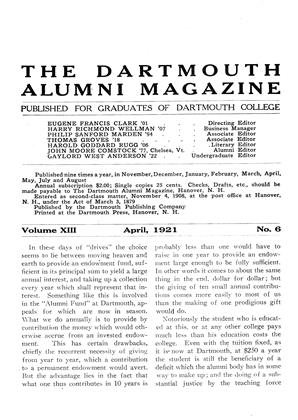A scant three-fifths of a point was all that separated Cornell and Dartmouth after the big triangular meet had developed into a thrilling battle for first honors between the Ithacans and the Green. The Crimson trailed, the final score being Cornell 361-5, Dartmouth 35 3-5, Harvard 26 1-5. The features of the meet were the tying of the world's record by Thomson and Anderson, the sensational victory in the mile of Captain O'Connell of Harvard, and the double win of John Shelburne, who carried the Green through to first place in both the 40-yard dash and the shotput. The deciding point came at the close of the afternoon, when Captain Thomson's great effort to overhaul Smith of Cornell in the final lap of the relay barely failed of success.
The first event in the meet, the 40-yard dash, was won by Shelburne, with Davison of Cornell coming in for second place and Sanderson of Dartmouth third. This gave the Green team the initial advantage of 6 points to 3 of Cornell, which was maintained in the 45-yard hurdles, in which Thomson came in first, Whitney of Harvard second, and Anderson of Dartmouth third. Previously, in the second heat, Anderson had tied the world's record of 6 seconds, but was unable to repeat this performance in the finals.
In the 300-yard run the Green runners were only able to make second place, the event being won by Gourdin of Harvard. Chamberlain came in second and Davison of Cornell got third. Up to this point the Green track men were in the lead over the representatives of Harvard and Cornell, but in the next three events the Cornelians gained a great advantage. Shem and Caldwell were unable to get a place in the 600-yard run and the honors went to Chapman and Richman of Cornell, who gained 8 points, and Doherty of Harvard 1 point. The 1000-yard run was carried away by Carter, Cook, and McDermott of Cornell, adding 9 more points to their record and bringing them to the forefront of the contest. The honors in the mile were divided between Harvard and Cornell, Harvard making first place, and Cornell second and third.
Harvard won the broad jump by 5 points to Dartmouth's 4. Gourdin of Harvard jumped 23 feet 2 inches to Thomson's 20 feet 9 inches, and Chun's 20 feet 8¾ inches. The Green team showed its need of Jordan in the pole vault, but Fisher, Kelsey, and Sammis tied with Stevens of Cornell and Wales of Harvard for third place. The event was won by Harwood of Harvard, who jumped 12 feet 3 inches. Gournlock of Cornell was second with a 12-foot jump. Dartmouth again came in first for the high jump, in which Brown made 6 feet 2 3-8 inches. Goodel of Harvard and Ramsey of Cornell were tied for second place.
Shelburne again starred for Dartmouth in the shotput with a throw of 41 feet 9¾ inches. Lee made second place for the Green, and Jewett of Cornell third.
Then came the deciding struggle of the meet. Dartmouth was leading in the field with 32 2-5 for a total. Cornell, the same old team of powerful runners, stood a shade behind with 31 1-5 to its credit, and Harvard 26 1-5. So the relay was destined to decide the result of the meet in favor of Cornell or Dartmouth. Harvard's chance to win had gone.
Righter, Chute, and Gruenhagen started and kept the same order until in the second lap Gruenhagen passed Chute, but fell back again before the relief was completed. The second relief was run off with the runners keeping the same position, but in the third relief, Moore of Dartmouth sped ahead past Whorten of Harvard, and at the end of the relief was just a yard behind the leader. The final relief was a thriller. Smith was in the lead, with Thomson only a stride behind. Throughout the whole course, the runners maintained these positions, Thomson trying to get ahead, but unable to head off the Cornelian anchor bearer.
In the freshman events, Jenkins of Dartmouth won first place in the 40-yard dash, and Norris and Jenkins (Harvard) second and third. Cornell won the yearling relay race and Dartmouth came in second.
 View Full Issue
View Full Issue
More From This Issue
-
 Article
ArticlePEN AND CAMERA SKETCHES OF HANOVER AND THE COLLEGE BEFORE THE CENTENNIAL
April 1921 By EDWIN J. BARTLETT '72 -
 Article
ArticleIn these days of "drives" the choice seems
April 1921 -
 Article
ArticleFRESHMAN MENTAL TESTS
April 1921 By CHARLES LEONARD STONE '17 -
 Sports
SportsBASKETBALL
April 1921 -
 Article
ArticleAMERICAN PROFESSORS AND STUDENTS RESENT CHARGES AGAINST FRENCH PEOPLE
April 1921 -
 Class Notes
Class NotesCLASS OF 1910
April 1921 By Whitney H. Eastman








